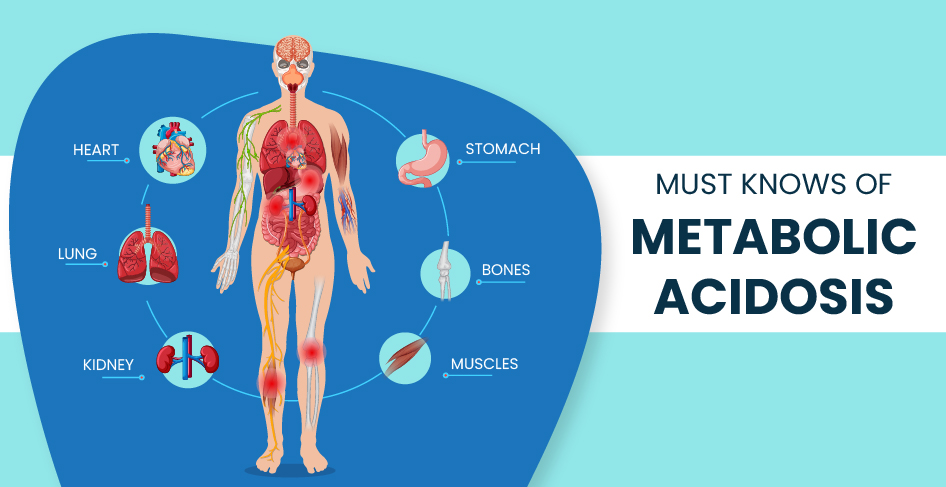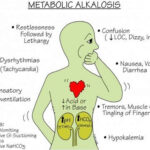Metabolic acidosis is a serious condition characterized by an excess accumulation of acid in the body due to increased acid production, decreased acid excretion, or bicarbonate loss. It disrupts the body’s normal pH balance, leading to potential complications if left untreated.

Causes of Metabolic Acidosis
Metabolic acidosis arises from several underlying conditions, which can be classified into high anion gap and normal anion gap metabolic acidosis.
1. High Anion Gap Metabolic Acidosis
This occurs when there is an accumulation of acids due to:
- Lactic acidosis: Resulting from tissue hypoxia, sepsis, or strenuous exercise.
- Ketoacidosis: Often seen in uncontrolled diabetes, chronic alcohol consumption, or starvation.
- Renal failure: Impaired kidney function reduces acid excretion.
- Toxic ingestions: Ingestion of substances like methanol, ethylene glycol, or salicylates.
2. Normal Anion Gap Metabolic Acidosis (Hyperchloremic Acidosis)
This results from excessive bicarbonate loss, often due to:
- Diarrhea: Profound loss of bicarbonate in stools.
- Renal tubular acidosis: A defect in kidney acid excretion.
- Use of carbonic anhydrase inhibitors: Drugs like acetazolamide can cause bicarbonate depletion.
Symptoms of Metabolic Acidosis
Symptoms vary depending on severity and underlying cause but may include:
- Rapid breathing (Kussmaul respiration in severe cases)
- Fatigue and weakness
- Confusion or altered mental state
- Nausea and vomiting
- Increased heart rate
Diagnosis of Metabolic Acidosis
Accurate diagnosis involves laboratory tests to determine blood pH and bicarbonate levels.
Key Diagnostic Tests:
- Arterial Blood Gas (ABG): Measures pH, bicarbonate (HCO3-), and CO2 levels.
- Serum Electrolytes: Helps assess the anion gap.
- Lactic Acid Levels: Identifies lactic acidosis.
- Ketone Levels: Detects diabetic ketoacidosis.
- Renal Function Tests: Evaluates kidney impairment.
Treatment of Metabolic Acidosis
Treatment depends on the underlying cause and aims to restore acid-base balance.
1. Addressing the Root Cause
- Lactic Acidosis: Oxygen therapy, treating sepsis, or correcting hypoxia.
- Diabetic Ketoacidosis: Insulin therapy and intravenous fluids.
- Renal Failure: Dialysis may be required for severe cases.
- Toxin Ingestion: Administration of antidotes like fomepizole for ethylene glycol poisoning.
2. Bicarbonate Therapy
In cases of severe acidosis (pH < 7.1), sodium bicarbonate may be administered to neutralize excess acid.
3. Respiratory Compensation
The respiratory system attempts to correct acidosis through hyperventilation, reducing CO2 levels.
Complications of Metabolic Acidosis
If left untreated, metabolic acidosis can lead to:
- Arrhythmias and cardiac instability
- Impaired oxygen delivery
- Bone demineralization in chronic cases
- Multi-organ failure in severe cases
Prevention of Metabolic Acidosis
- Managing underlying conditions like diabetes and kidney disease
- Staying hydrated and maintaining proper electrolyte balance
- Avoiding excessive alcohol consumption
- Prompt treatment of infections and toxin exposures
Metabolic acidosis is a critical medical condition requiring timely diagnosis and intervention. Understanding its causes, symptoms, and treatment strategies is essential for effective management and prevention of complications.

